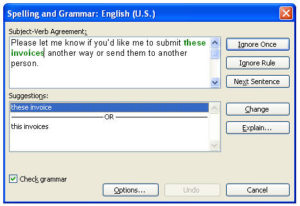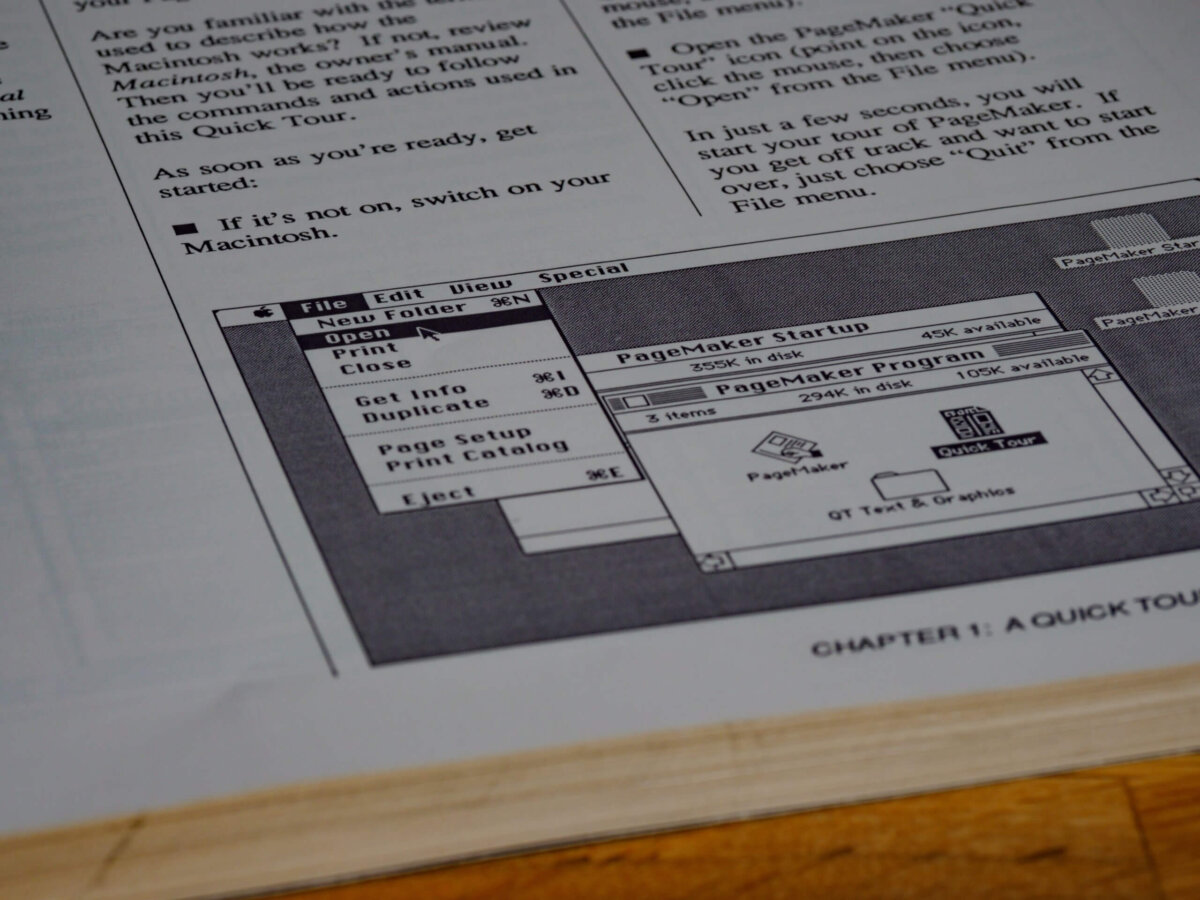I’d just drafted a rather terse “when am I gonna get paid?” e-mail to a client who owed me money. I was all ready to hit Send when I reminded myself, “Always run a spelling and grammar check,” even if you’re writing in a state of righteous (unpaid) indignation.
So I ran Word’s spelling and grammar checker, and here’s the confused mess of feedback I got in return:
Both of Word’s helpful suggestions were wrong:
- Please let me know if you’d like me to submit these invoice…
- Please let me know if you’d like me to submit this invoices…
What was going on? The Microsoft Office Word Help article on the grammar checker explained:
problems by performing a comprehensive analysis of the text. The grammar checker
may not look for all types of problems; it’s designed to focus on those that are
most typical or frequent.
Has Word’s grammar checker ever steered you wrong? If so, let me know. It’ll be fun to gang up on this unreliable tool!
— Leslie O’Flahavan








Leslie –
Great post!
I mostly try to ignore the little green underline, but two cases really bug me:
1. It thinks “staff” is a singular, rather than a collective noun, which (on this side of the Pond) we treat as plural. For example, it likes “The staff was tall enough for each soldier to see the flag” but it doesn’t like “Customer service staff are frequently trapped between company policy and a desire to do the right thing for the customer.” Since service and support professionals are called a dizzying array of names (engineers, agents, analysts, TSEs, CSRs, etc.), I find myself
using “staff” frequently. Word always gets it wrong.
2. It thinks passive constructions are wrong. Certainly, there’s good reason to prefer the active voice in most cases, but sometimes I choose passive consciously–generally to place the emphasis on what
would be the direct object. If I write, “Brand perceptions are mostly created by things that happen outside of a one-to-one conversation between employee and customer,” I don’t want it to suggest “Things that happen outside of a one-to-one conversation between employee and
customer mostly create brand perceptions.” A good editor might improve the sentence, but I wrote it that way for a reason.
Thanks for letting me vent,
David
Thanks for your comments on grammar checker, David.Your active voice rewrite of the (intentionally) passive sentence is hilarious.
— Leslie O.
Dear Leslie,
I used to teach writing, and I miss opportunities to preach… er, teach. So here goes my rant.
If I use grammar checker (GC) at all, I do so with caution and great skepticism. It’s like a drug. Misused, or overused, it can be hazardous to the world’s grammatical health. Without proper vigilance, it can do more harm than good, steering completely off course those hapless souls who don’t know a noun* from a verb from a participle from a hemi-semi-demi quaver; and whose dangling modifiers (my favorite) and other sundry infelicities will always escape the grammar net.
Its** abhorrence of passive voice is particularly annoying–in part because it mistakes many active constructions for passive and also because, as you know, passive voice is sometimes preferable in a particular series of sentences, putting the emphasis right where it belongs. It also doesn’t know the difference between restrictive and nonrestrictive modifiers, and when to use ‘which’ or ‘that’…
GC doesn’t like me any more than I like it. It is utterly flummoxed by sentences with embedded clauses and complex turns of phrase. I happen to be the sort of writer who routinely constructs sentences that mystify GC. I look at my document and see all of those annoying squiggly lines…. Right now I look at this e-mail and see ‘doesn’t’ called out. What the–? No contractions allowed? Must we be so formal?
I leave it turned on because once in a great while it catches something that I might have missed in the proofreading. And yet it misses real errors that might creep in during one of my less alert writerly moments. Whatever it tells me, I consult what I know to be true and right (in my very own head), and mostly ignore its wagging finger. It’s a very unreliable and inconstant friend who needs constant monitoring and needs a stern rebuke now and then. (I’ve been known to swear at it.)
I shudder to think how many people rely on grammar checker without being able to exercise independent judgment. Microsoft should issue an emphatic disclaimer: Use with caution! Do not operate while intoxicated! Use only in the presence of an authorized expert! As you rightly point out, not only is grammar checker often not right; it’s often dead wrong, even asking writers to introduce errors into perfectly acceptable, if not elegant, sentences.
Thanks for listening/reading!
* I first wrote nun, which would not have been caught by spell checker.
** Eek. If I had typed ‘it’s,’ would grammar checker have noticed or cared? It likes ‘eek,’ by the way…. Hm.